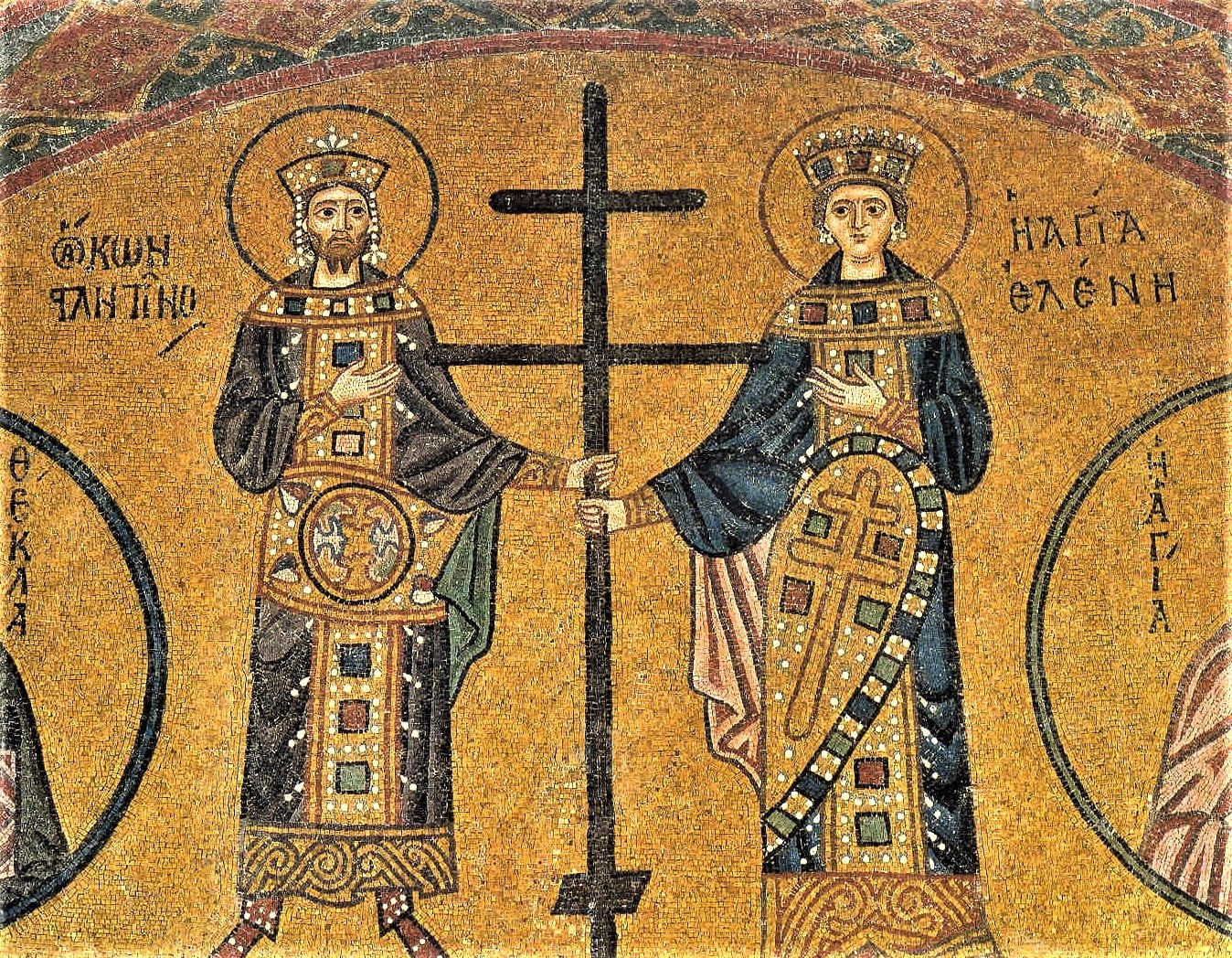Homily for Sts. Constantine and Helen, equal to the Apostles

On May 21st, the Church commemorates two saints with particular gratitude, for the great services rendered to God. They are St. Constantine, and his mother St. Helen.
St. Constantine was born in the town of Nysos (which is now the city of Nis in Serbia) around 275 AD. His father, Constantius Chloros, was of Greek-Illyrian origin and rose to become Emperor of the Western half of the Roman Empire. His mother was a virtuous and devout Christian named Helen, who was born in the town of Drepana, Bithynia (Asia Minor) around the year 247 AD. History has called St. Constantine “the Great” for his prudence in politics, his military skill, his courage, and his role in the development of the Eastern Roman Empire, starting with the moving of the capital from Rome to Byzantium (renamed Constantinople after himself). The fruit of this was the flowering of Byzantine civilization for a thousand years, producing great works which not only benefited the Empire itself, but other peoples as well. The Church honors him with the title of Isapostolos (“Equal to the Apostles”) and as a Saint, for his work in defending the Christian faith in the empire and in the home.
With the famous Edict of Milan in 313 AD, the Emperors St. Constantine and Licinius granted religious freedom to the people of the Roman Empire. All persecutions ceased, with Christians released from prison, and all of those persecuted by Diocletian and Licinius were allowed to return home. St. Constantine, as Emperor, instituted Sunday as a day of public worship to facilitate Christian worship for churches throughout the Empire. He also established order in the Church, convening the First Ecumenical Council in Nicaea, Bithynia, in 325 AD. This council dealt with the Arian heresy, and formulated the Christological Doctrine in the Symbol of Faith. He also built magnificent churches, such as St. Irene’s (Αγία Ειρήνη) in Constantinople, and the Church of the Holy Apostles, where he aspired to collect the Holy Relics of all the Holy Apostles.
His partner in these wonderful endeavors was his Christian mother, St. Helen. She contributed much, even going to the Holy Land to find the actual Holy Cross of the Lord. She saw to the building of the Church of the Resurrection in Jerusalem, the Church of the Nativity of the Lord in Bethlehem, and others. After devoting the rest of her life to prayer, and miraculous works of charity, she reposed in the Lord around the year 328 AD at the age of eighty. The Church declared her a saint, and celebrates her memory on the same day as her son, St. Constantine, also as Isapostolos (“Equal to the Apostles”).
The story of St. Constantine’s baptism written by Eusebius, the Bishop of Caesarea in Palestine is quite moving, being done at the end of the Emperor’s life. Bishop Eusebius writes of the Emperor’s great alms and offerings, and how he looked. Towards the end, when he was catechized and felt that his soul was ready to receive Holy Baptism, he called the Orthodox Bishops who accompanied him. He expressed to them his desire to be baptized, and said the following memorable words: The time is arrived which I have long hoped for, with an earnest desire and prayer that I might obtain the salvation of God. Then the Bishops baptized Constantine the Blessed. Afterwards, he wore the white robes of baptism, which were not removed until his repose. After receiving Holy Communion, he burst into praise of God. St. Constantine slept in the Lord on the day of Pentecost, May 22, 337 AD at the age of sixty-three.
When studying the life of this great Emperor and Saint, we can see that despite his office and the glory that came with it, he was not bound by them. His soul longed for something more. His deep desire was the salvation of his soul, which was revealed in his last days. After deep repentance for what he had done in his busy life, he was baptized, feeling completely happy and at peace. He no longer wished for earthly greatness. As the Bishop Eusebius once again writes: He refused to clothe himself with the purple any more. He then lifted his voice and poured forth a strain of thanksgiving to God; after which he added these words. Now I know that I am truly blessed: now I feel assured that I am accounted worthy of immortality, and am made a partaker of Divine light.
By Metropolitan of Pisidia Sotirios
Source: pemptousia.com




